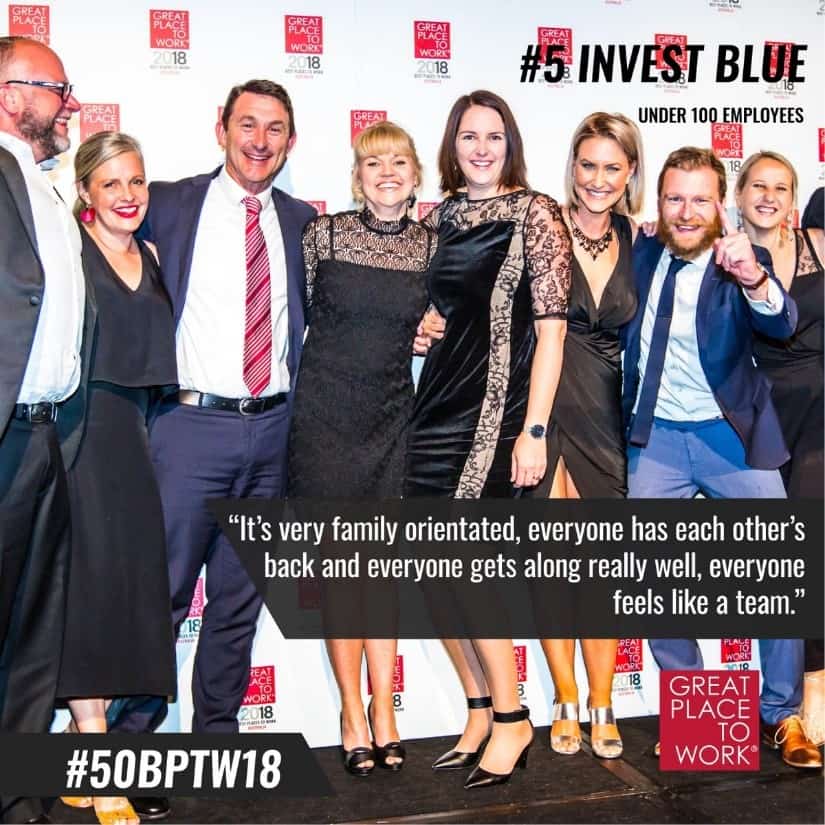What it takes to become a Financial Adviser: the Invest Blue edition
April 7th 2021 | Categories: Invest Blue News | Advice Space | Value of advice |

Starting (and maintaining) a career as a Financial Adviser is no easy task. The process of obtaining licenses can be lengthy, ongoing education is required, and the advice industry can be a high-stress environment.
However, as many of our Financial Advisers will attest, if you are passionate about helping people reach their goals and dreams by providing meaningful advice, the pros far outweigh the cons. Moreover, a career in financial advice can offer work schedule flexibility once a client base is established and creativity in building that client base, including what you choose to specialise in.
If this career sounds like a dream come true, or you’re curious about what your Financial Adviser must adhere to in offering you quality, tailored advice – read on!
We are here to help you realise your dreams and goals so that you can live your best possible life. We do this by getting to know you and what is most important to you.
Financial Planning is much more than choosing products and funds. A financial plan defines your goals and what you need to do to achieve them.
What does it take?
The legal stuff…
The advice industry is experiencing massive changes and as a result, what it takes to become a Financial Adviser is changing also. It can be a confusing industry to navigate, and unexpected changes occur. But in a nutshell, to become a Financial Adviser, you must comply with a professional standards framework that sets minimum education, experience and ethical standards (i).
To become a Financial Adviser from 1 January 2019, you must:
- Complete a FASEA approved bachelor or higher or equivalent qualification
- Complete a Professional Year (PY) of supervised experience
- Pass the FASEA exam
- Comply with Continuing Professional Development (CPD) requirements
In a somewhat perplexing scene of events, the Financial Adviser Standards and Ethics Authority (FASEA) has ceased to exist; and its roles are now carried out by Treasury and ASIC’s Financial Services and Credit Panel (FSCP) (i).
However, if you were hoping to avoid higher education or exams, don’t celebrate too soon. You will still be required to sit the exam and obtain an approved bachelor degree (or higher or equivalent) if you wish to become a Financial Adviser (i).
Moreover, existing Financial Advisers must meet qualification requirements by no later than 1 January 2026. Those who have complete an approved or relevant degree may be eligible for recognition of prior learning (RPL) and bridging course subjects. However, those who hold no degree or a non-relevant degree are required to complete a Graduate Diploma. Existing Advisers must also pass the FASEA exam by 1 January 2022 (i).
“I had already studied a Bachelor of Business Administration, but [to become a Financial Adviser] I had to study four related subjects, including Ethics and Professionalism. I did this because I wanted to help people achieve their personal goals, which in my opinion is not always possible as a Business Administrator,” shares Carol Herrmann (FP).
Many Advisers choose to use HECS-HELP debt to help pay for part or all of their tuition fees. This means you don’t have to pay upfront to study. Read our article on the good and the bad of HECS debt to learn more.
We are here to help you realise your dreams and goals so that you can live your best possible life. We do this by getting to know you and what is most important to you. Why not book an appointment with one of our Advisers today?
[ninja_form id=37]
The soft skills…
While changing legislation and higher education have been a hot topic in recent years, we should not ignore the importance of soft skills in the advice industry. Soft skills include interpersonal (people) skills, communication skills, listening skills, time management and empathy for others (ii).
To be successful as a Financial Adviser, you must have the ability to build and nurture relationships with clients through trust gained from interpersonal skills and emotional intelligence (iii). After all, what good is an outstanding technical knowledge of complicated financial products if you can’t communicate these effectively with your client?
Unlike hard skills learned in a traditional classroom, soft skills are similar to emotions or insights that allow you to read others. If you’ve been working for a while, chances are you’ve already developed some soft skills (ii). You can also develop soft skills at school, volunteer activities and in your Professional Year (PY).
“Soft skills can help Financial Advisers to ask the right questions to establish what is important to their client and set goals to achieve this. These skills also elicit trust and allow Advisers to be diplomatic when motivating their clients to make the right financial decisions,” explains David French (CFP).
In addition to professional standards and soft skills, Invest Blue recruits self-motivated people who want to learn and grow. You must be passionate about helping people and being part of a highly motivated team.

Get inspired to help people reach their goals and make better financial choices by reading our client stories.
Remember, the path is not always linear!
While this how-to guide is for those high school graduates looking to enter the workforce for the first time. It is also for mature students seeking a meaningful career change. Not everyone will find their perfect job straight away, and that is okay!
The days of choosing one career path straight out of school and sticking to it are gone, and non-linear career paths have become the new norm. So, if you’re thinking you missed the boat in becoming a Financial Adviser – think again!
Steve became a Financial Adviser with his father-in-law, Terry Wells, after leaving accounting. Steve was so inspired by Terry’s professionalism and approach to building life-long relationships with clients that he left his previous profession to build an office with Terry in Penrith (Financial Independence Planners), which later merged with Invest Blue.
“That is what makes me the proudest. That we are still part of a great business focussed on helping many of the same clients Terry helped, and more, live their best possible life,” shares Steve Fort (CFP).
Sadly, Terry passed away in 2008. But his legacy lives on through his team which continues to help many of the same clients Terry helped and more. A prime example of a brilliant Financial Adviser inspiring others to make a meaningful difference.

Moreover, Taylor attended university straight out of high school but quickly realised it was not something she wanted to pursue. Instead, she packed up her life and went travelling to do some soul searching. In planning her trips, Taylor fell in love with budgeting. Reluctant to return to university, she decided to dip her toes into the advice industry by completing a Diploma in Financial Planning. Soon she was hooked. Taylor returned home from her travels to complete an Advanced Diploma in Financial Services and started her first job as a Financial Adviser for an industry super fund.
“Although I haven’t taken the ‘traditional route’ to become a Financial Adviser, I have progressed through hard work, experience on the ground and the supportive network within Invest Blue to allow me to do the thing I love most every day,” says Taylor Peiris (FP).
To gain exposure to holistic financial advice and further develop her career, Taylor became an Associate Adviser at Invest Blue. Through level up training, she quickly progressed through her role as an Associate, Salaried Planner, and is now a Growth Planner.
So, what is Level-Up Training?
Invest Blue is committed to developing and maintaining teams of highly skilled people with our culture rewarding and encouraging innovation. We are committed to growing our people through structured training, rewarding career paths and continued professional development.
“We believe creating a business environment where people are engaged, love what they do, and love coming to work directly benefits the clients we serve. It makes for an awesome place to do your best work, and it makes for excellence in service delivery,” explains David Stephen (CFP).
In addition to CPD requirements, Financial Advisers (and other departments) at Invest Blue are required to participate in level up training. We want to enable our people to live their best possible life, which includes being the best they can be at what they do.
“We empower our people to drive their own development and learning. Each quarter we ask our people to set level up goals, to articulate areas they wish to focus on to help them improve in their role and contribute to the goals of the business,” explains Kasey (Head of People & Culture).
Consistently in the top 10 out of 50 best places to work in Australia, we must be doing something right!

That’s all folks!
You are now equipped with the necessary knowledge to become a Financial Adviser at Invest Blue. To make it in the advice industry, you must comply with professional standards, possess soft skills, be willing to upskill throughout your career, and above all, be passionate about providing meaningful advice to clients.
Did you know our experienced Financial Advisers have been listed on the Most Trusted Advisers (MTA) Network for 5 years running?

The right advice can make a big difference in your financial future. Why not speak to one of our Advisers today?
[ninja_form id=41]
What you need to know
This information is provided by Invest Blue Pty Ltd (ABN 91 100 874 744). The information contained in this article is of general nature only and does not take into account the objectives, financial situation or needs of any particular person. Therefore, before making any decision, you should consider the appropriateness of the advice with regards to those matters and seek personal financial, tax and/or legal advice prior to acting on this information. Read our Financial Services Guide for information about our services, including the fees and other benefits that AMP companies and their representatives may receive in relations to products and services provided to you.
Reference:
(i) https://www.cpaaustralia.com.au/professional-resources/financial-planning/professional-standards
(ii) https://www.thebalancecareers.com/what-are-soft-skills-2060852
(iii) https://www.kaplanprofessional.edu.au/blog/the-importance-of-client-engagement-skills-in-financial-services/
Posted in Invest Blue News, Advice Space, Value of advice
